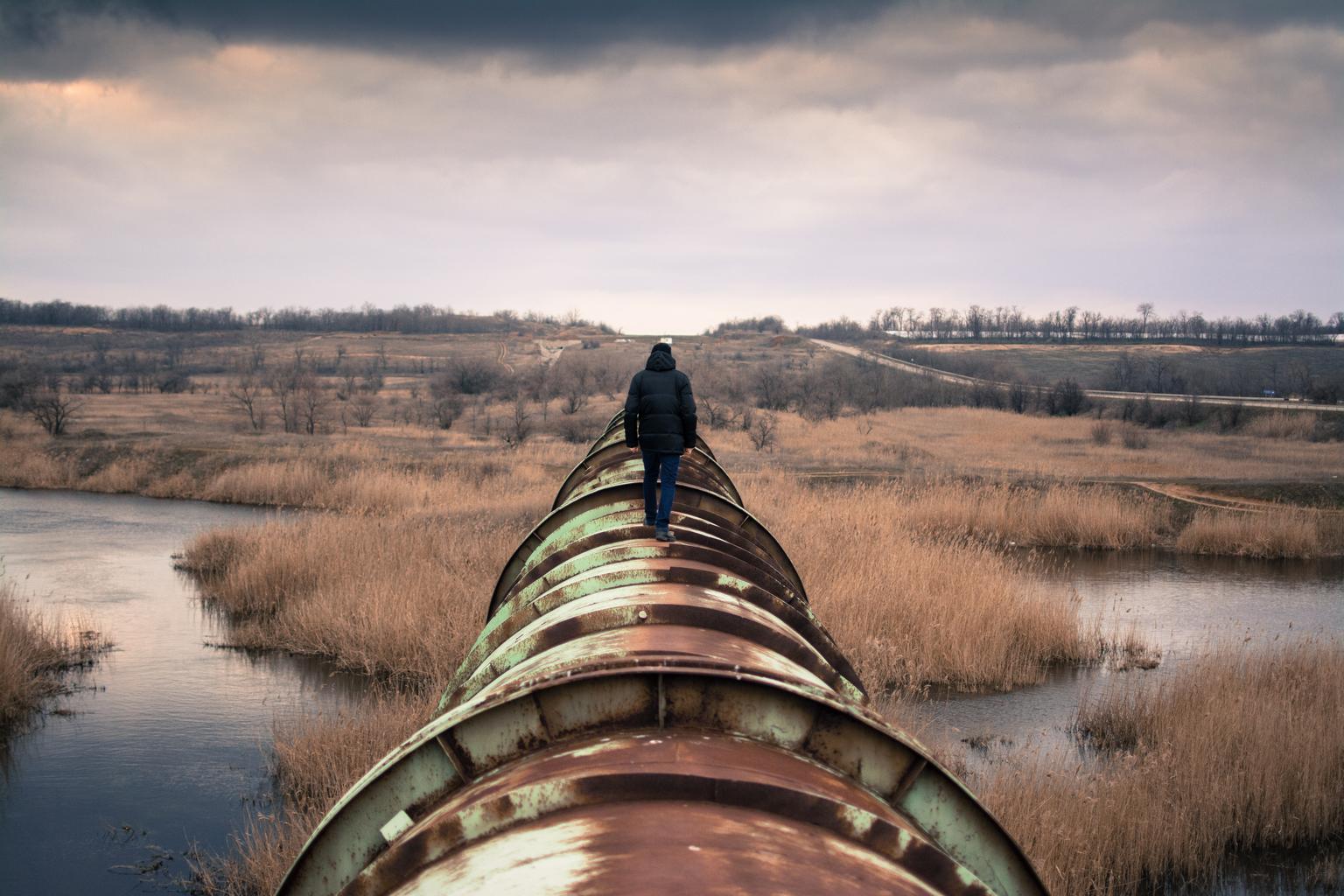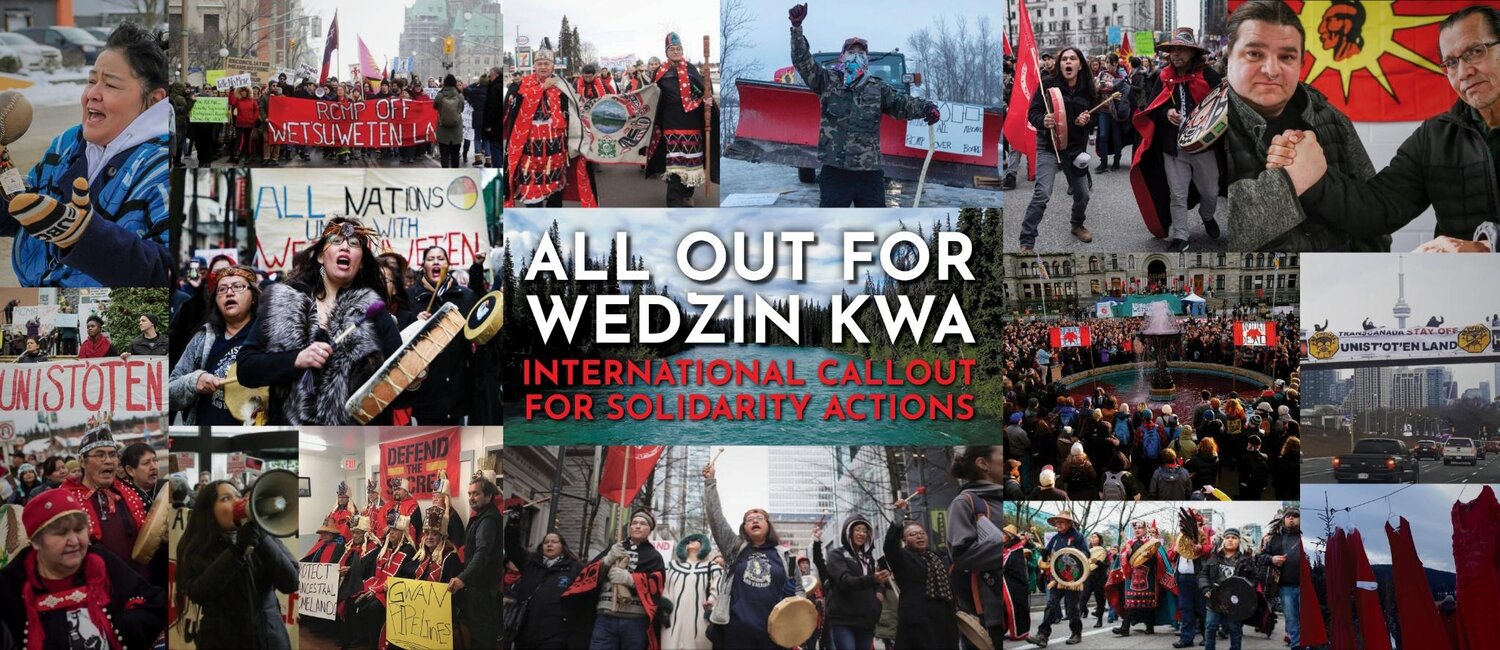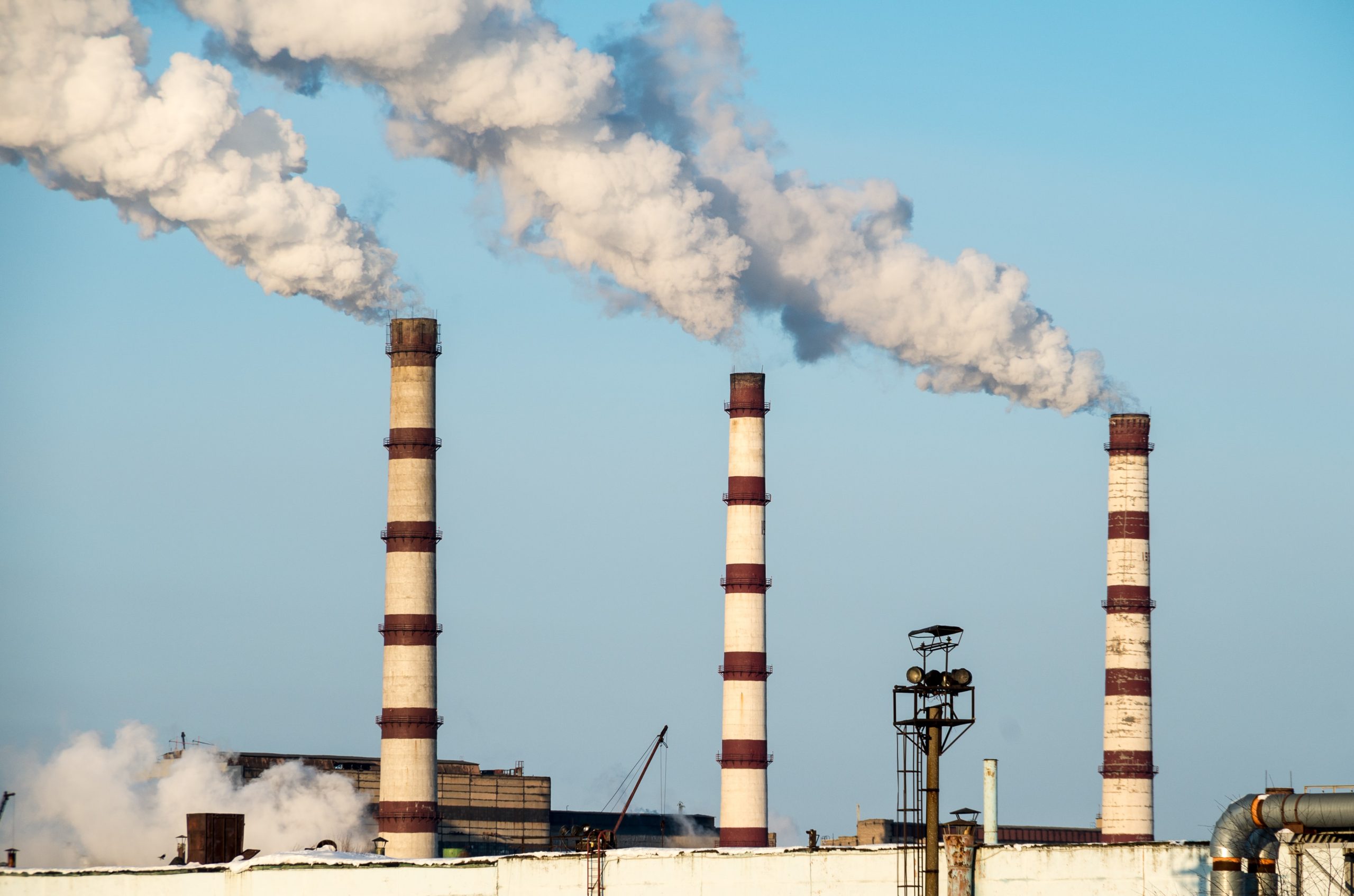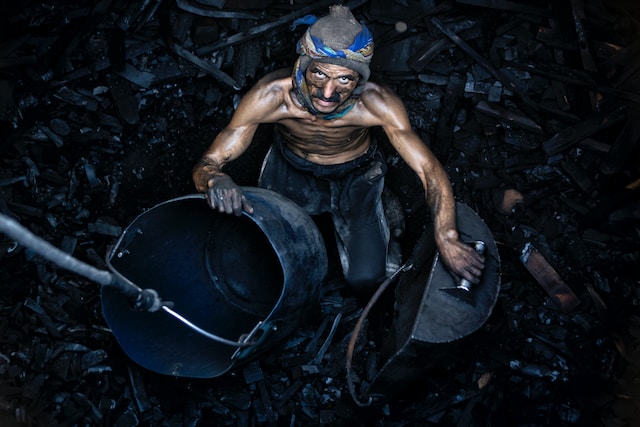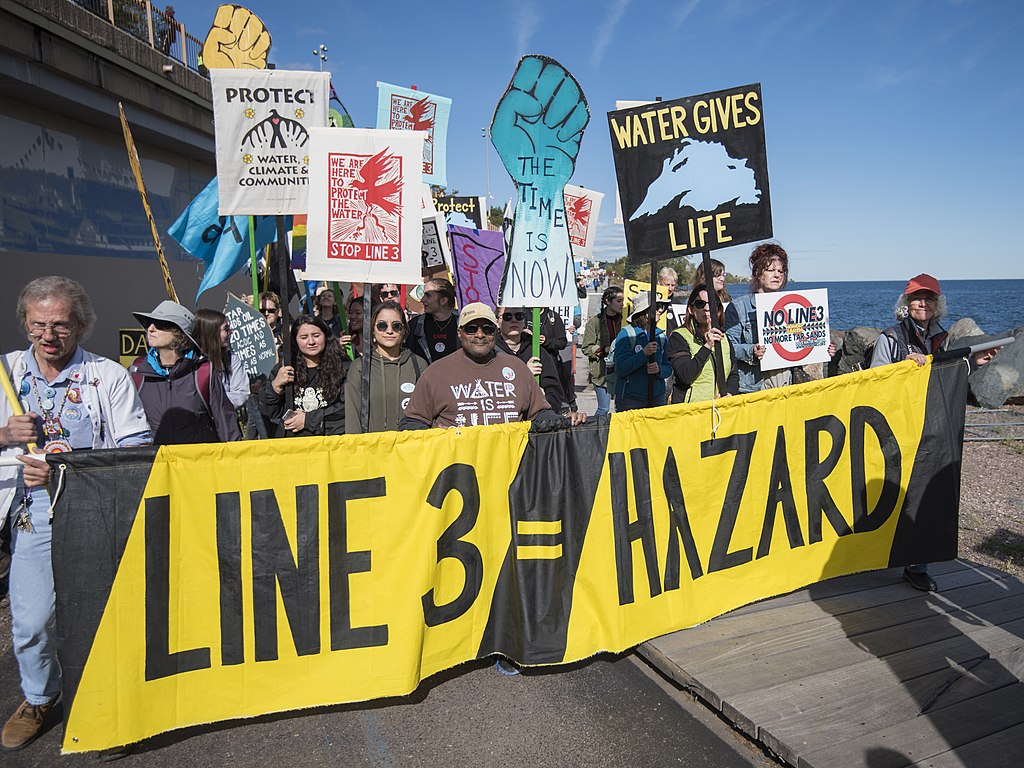
“People vs. Fossil Fuels’’: Winona LaDuke & Mass Protests Call on Biden to Stop Line 3 Pipeline
This piece was first published at Democracy Now!
By AMY GOODMAN
In response to the completion of the contested Line 3 pipeline, which is now reportedly operational, thousands of Indigenous leaders and climate justice advocates are kicking off the “People vs. Fossil Fuels’’ mobilization, an Indigenous-led five-day action of civil disobedience at the White House to demand President Biden declare a climate emergency, divest from fossil fuels and launch a “just renewable energy revolution.” “This pipeline doesn’t respect treaty rights,” says Winona LaDuke, longtime Indigenous activist and founder of Honor the Earth, a platform to raise awareness of and money for Indigenous struggles for environmental justice. “They’re just trying to continue their egregious behavior. It’s so tragic that, on the one hand, the Biden administration is like, ’We’re going to have Indigenous Peoples’ Day, but we’re still going to smash you in northern Minnesota and smash the rest of the country.’” LaDuke faces criminal charges linked to her protest of pipelines in three different counties.
Transcript
This is a rush transcript. Copy may not be in its final form.
AMY GOODMAN: This is Democracy Now!, as we continue to talk about Indigenous action to save our Earth. This week, thousands of Indigenous leaders and climate justice advocates are expected to participate in a historic five-day massive action of civil disobedience at the White House to continue to pressure President Biden to declare a climate emergency, divest from fossil fuels and launch a, quote, “just renewable energy revolution.”
The “People vs. Fossil Fuels” mobilization, led by the Indigenous Environmental Network, 350.org, Sunrise Movement, the Center for Biological Diversity and others, comes as Canadian pipeline company Enbridge has completed the construction of its contested Line 3 crude oil pipeline in northern Minnesota. The pipeline is reportedly now operational, violating the treaty rights of local Indigenous communities. Line 3 is set to carry over half a million barrels of tar sands oil every day from Alberta, Canada, through Minnesota to the tip of Lake Superior in Wisconsin, threatening sacred wild rice watersheds in Minnesota, local waters and lands, and doubling Minnesota’s greenhouse gas emissions.
Indigenous leaders and land and water defenders, who have been resisting Line 3 for years, often putting their own bodies on the line, vowed to continue the fight against the pipeline. Last week, a small group of water protectors confronted Minnesota Senator Amy Klobuchar at a fundraising event, where advocates say plates cost $1,000 a person, demanding her to take action against Line 3.
WATER PROTECTOR: We’re asking you to call on President Biden to stop Line 3. It has a higher carbon footprint than the entire state of Minnesota. And this climate crisis — I mean, you saw Hurricane Ida. You saw how many people died. And we just really need you to call on him and ask him to stop it.
AIDE: Excuse us.
SEN. AMY KLOBUCHAR: Thank you. Yes, I know about the concern.
WATER PROTECTOR: Because you have so much power. You have so much power.
SEN. AMY KLOBUCHAR: I’ve brought those concerns to him. Thank you.
WATER PROTECTOR: And as a young person, the climate crisis is a thing that really concerns me, and stopping Line 3. We can’t have climate justice without you stopping Line 3 and asking President Biden.
SEN. AMY KLOBUCHAR: Thank you.
WATER PROTECTOR: I know that you don’t have a vote, and I know that you can’t vote in the Senate to stop Line 3. But President Biden has that power. And you have the power.
AMY GOODMAN: “You have the power.” More than 900 water protectors have been arrested over their resistance to Line 3, with some protesters facing felony charges as they were brutalized by police. Some water protectors also reported being denied medical care and being placed in solitary confinement after their arrests. Well, The Guardian newspaper revealed last week that Enbridge paid Minnesota police $2.4 million in reimbursements, all costs tied to the arrests and surveillance of hundreds of water protectors, including officer training, wages, overtime, meals, hotels and equipment for the local police, paid for by an international corporation.
For more, we’re joined in Ponsford, Minnesota, by Winona LaDuke, longtime Indigenous activist, who’s been organizing for years to block Enbridge Line 3. She lives and works on the White Earth Reservation in northern Minnesota, is executive director of Honor the Earth. Her piece for the Minneapolis Star Tribune is headlined “Line 3 opponents can savor this defeat.” Her latest book, To Be a Water Protector.
Winona, welcome back to Democracy Now! So, if you can talk about these latest revelations of this Canadian company paying the local police to arrest you all, and also what it means that Enbridge says Line 3 is operational?
WINONA LADUKE: [inaudible] Enbridge’s Line 3 is operational will say that they’ve been hurrying really fast because the federal court has yet to rule on whether Enbridge has any ability to move forward. There’s no federal environmental impact statement on this project, which is why we want Joe Biden to stop it. I mean, they stole 5 billion gallons of water, fracked 28 rivers out, and then they have this broken aquifer losing 100,000 gallons a day of water. They have no idea how to fix this stuff, since January. You know, it’s really horrible up here. So, you know, Enbridge has been trying to rush to get this online before the court will rule against them, because, generally, courts have not ruled in favor of pipelines. That’s the status that we have seen, you know, in the federal court ruling on the DAPL, where the federal court ordered them to close down. This is the same company. Enbridge was 28% of DAPL. And when the federal court ordered them to close down the pipe, they said no. When the state of Michigan ordered them to close down a pipe this last May, they said no. So they’re just trying to continue their egregious behavior.
It’s so tragic that, you know, on one hand, the Biden administration is like, “We are going to have Indigenous Peoples’ Day, but we’re still going to smash you in northern Minnesota and smash the rest of the country.” Same thing, you know, Klobuchar and Smith, the two Minnesota senators, shameful their lack of courage, not only for Indigenous people but for the planet, you know?
So Enbridge is trying to get that oil out. In the meantime, it’s a disaster up here. I’m still up here monitoring the line and monitoring what’s going on, because it’s crazy. And just to say, they don’t have Indigenous Peoples’ Day apparently in Becker County, because have a court date today. So, you know, no break for Indigenous people. You could still go to court. You know, it’s just insane up here.
AMY GOODMAN: So, how does your activism change now that it’s supposedly operational, the pipeline? And what exactly does it mean? For people who aren’t familiar with Line 3, talk about its course, from Canada through the United States, and why you’re so concerned about this particular pipeline.
WINONA LADUKE: OK. Well, first of all, the pipeline is 915,000 barrels a day of oil. That’s a lot of oil that’s going to move through it, if they get their way. And that oil, like, this is the last tar sands pipeline. Now, how we know this is the last tar sands pipeline is that our alma mater — remember, Amy, when we were at Harvard trying to get them to divest in South Africa? No, but they just are divesting in fossil fuels. Everybody is fleeing the tar sands. And it’s an industry that’s at its end. Like, Canada needs to quit trying to breathe life into the tar sands and breathe life into boarding schools and residential schools. They need to just stop being the criminals that they are.
You know, so, forcing them — they’re four years behind schedule, if they get to oil. And in that four years behind schedule, the industry is falling apart. There’s no new investment in tar sands infrastructure. And it’s the dirtiest oil in the world. Then add to that the fact that the company can’t even get insurance for its pipeline. Like, I’m just trying to understand what kind of fiscal responsibility exists in the state of Minnesota, that Enbridge divulged a couple of weeks ago that they can’t get insurance for their pipeline. And so, you have an accident, it’s going to be just like Bhopal and Union Carbide. These guys are going to pack up and go back to Canada. You know, I mean, it is a really horrific situation. And, you know, the impact of it is so wrong. You know, I mean, it’s not only the equivalent of 50 new coal-fired power plants, but right now our rivers are dry. They took 5 billion gallons of water from the north. Enbridge and the Walz administration are climate criminals.
And the Biden administration needs to stand up. You know, on one hand, I’m looking at Joe Biden, and I’m so grateful. Like, Bears Ears, that was the right thing to do, you know, to get back and to be the people that are supporting Indigenous people and Land Back. Let’s go, Joe. Let’s go. Let’s go, Joe. You know, 80 million acres of national parks stolen from Indian people, let’s start returning those, too, along with creating new national parks. We could just start returning land that was stolen. That would be a great step.
And then, actually, when you have Indigenous people in your administration, Joe, like Deb Haaland or maybe Jaime Pinkham at the Army Corps of Engineers, let them do their job, instead of having politics, oily politics, intervene. You know, I know that Deb Haaland does not support this pipeline. No sane person supports this pipeline. Only people who want to take oil money from Canadian multinationals support this pipeline. And I know that Jaime Pinkham, assistant in the Army Corps of Engineers, came up here, came up and visited, and saw what was going on and the disaster.
Our tribes have sued, you know, trying to stop this, sued in federal court. That federal court hearing is yet. And our tribes also have a tribal court hearing, where the federal courts have ordered Enbridge to come to our court, because we say that they’re climate criminals and they’re destroying the rights of wild rice. Actually, the state DNR has been ordered into tribal court.
You know, so, Joe, if you appoint Indian people, don’t just make them pretty Indian people that sit in your administration. Let them do their job. Indigenous thinking is what we need in the colonial administration. That’s when change happens.
AMY GOODMAN: As we wrap up, Winona, in August, you met with the U.N. special rapporteur on human rights defenders to share the police violence suffered by water protectors protesting the Line 3 construction site. And now we are learning just how much money the Canadian corporation gave to the local police to do the arrests, to do the training, etc. What happened with the U.N. rapporteur?
WINONA LADUKE: The U.N. rapporteur has asked the United States a bunch of questions and is expecting a response on what exactly the United States is planning to do to protect the human rights of Indigenous peoples, because this pipeline does not respect not only treaty rights, but, you know, when you get 900 people arrested and they’re brutalized with all kinds of — you know, I mean, it is torture. Some of what was done to these people is classified as it’s excessive force. So, the United Nations has called to task the United States on the Enbridge pipeline. And so, on Indigenous Peoples’ Day, that’s part of what we are saying, too, is it’s a time to account.
And I just want to say that this isn’t just like our problem, because the Enbridge model — like, first of all, Canadian multinationals kill people in Third World countries. That’s what they do. You know, that is known. Seventy-five percent of the world’s mining corporations are Canadian, and all through Latin America there’s human rights violations. This is no different. This is a Canadian multinational and Indigenous people. And two years ago, we told Attorney General from Minnesota Keith Ellison that this was going to be a problem. You know, we have had no action. And instead what we have is our rights continue to be violated. And, you know, I’ve got charges in three counties, more probably coming soon. I mean, this is like —
AMY GOODMAN: What do you face?
WINONA LADUKE: And this is a national problem, because the Minnesota model is being considered nationally, that corporations should finance your police. And that is — you know, in any way you look at it, that’s definitely a violation of the public trust, to have corporations financed by the police. And the Minnesota —
AMY GOODMAN: What charges do you face, Winona?
WINONA LADUKE: I’ve got trespassing, obstruction. I think I’ve got some public safety, you know, causing public safety problems because cops could have been doing something else instead of monitoring people on the pipeline. A lot of trespassing charges — Aitkin, Hubbard, Wadena County. I’ve got charges in three counties so far.
AMY GOODMAN: Well, best of luck to you today in court, Winona LaDuke, longtime indigenous activist, executive director of Honor the Earth, speaking to us from northern Minnesota.
When we come back, we look at the Russian journalist who was just awarded the Nobel Peace Prize on Friday. Stay with us.

